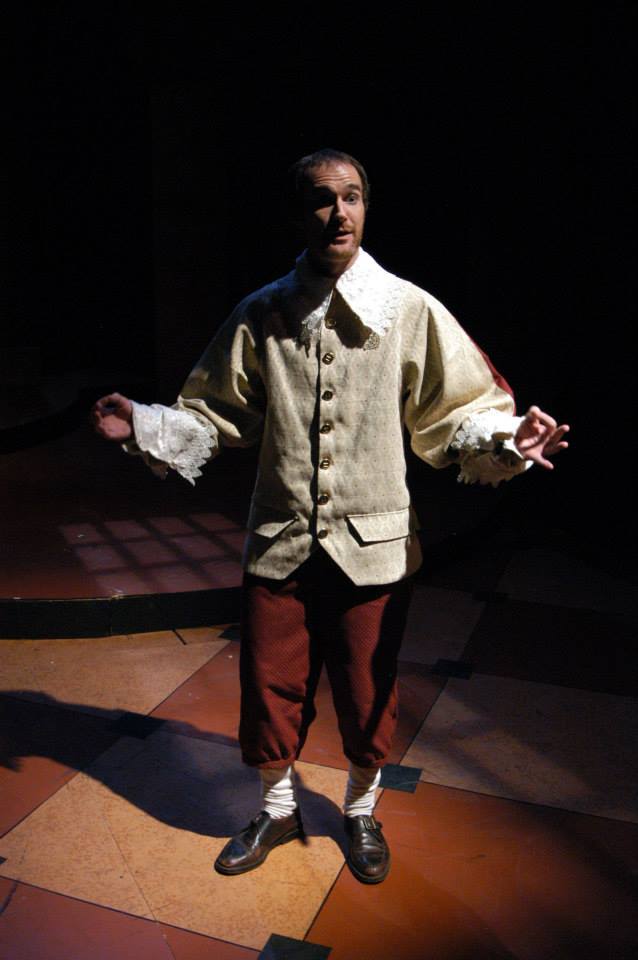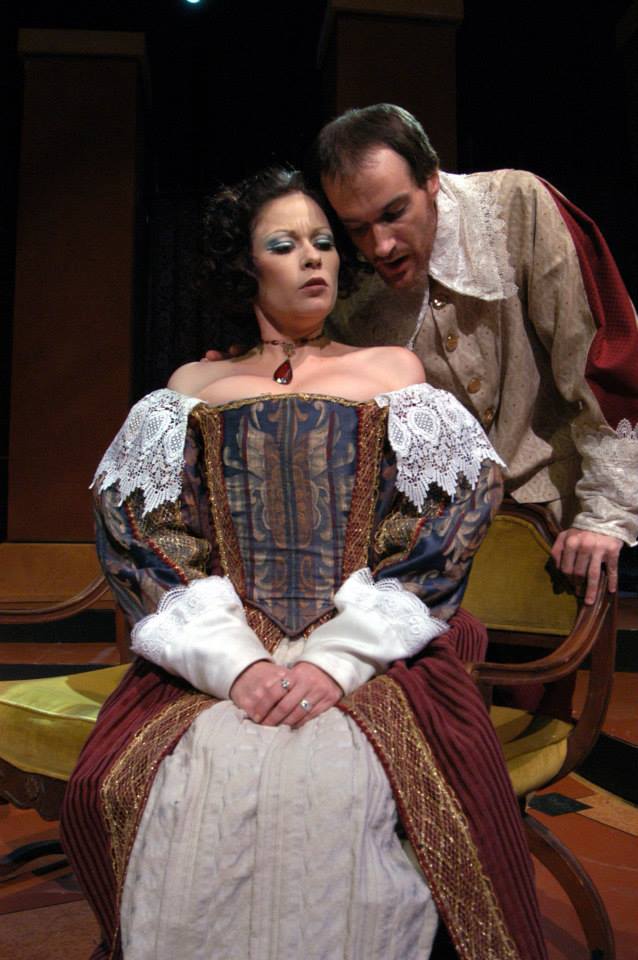

PLEASE HELP
This page is in development. I would be grateful if you would share any memories, anecdotes, photographs or other memorabilia. Please use the button at top right to contact me and I will give you the details on sharing. Thank you, Kyle Lawson, page manager. (PS: It would help if you could provide the IDs of those pictured, the name of the production, the year, the company and the photographer credit. If you know them, that is.)
PHOTOGRAPHS, REVIEWS & THE KITCHEN SINK


Excerpt of the review of “Cardenio” by Chris Page in the East Valley Tribune.
“But the biggest flaw is that the secondary story — in which Votario (played by Christian Miller) agrees to test the faithfulness of his friend’s wife (Jennifer Banda) by coming on to her, only to find himself actually smitten — is far more interesting than the title tale. Miller and Banda are a joy to watch, and Miller’s comic asides are just too darn funny. Isn’t this supposed to be tragedy?”
JANUARY 2007. “Leading Ladies.” Phoenix Theatre. Cast: Dion Johnson, Christian Miller. Costumes: Gail Wolfenden-Steib. Costume Shop Manger: Marjie Bell.
Kyle Lawson, The Arizona Republic, Jan. 7, 2007
Leading Ladies, the new comedy at Phoenix Theatre, is out to mislead you. Don’t give ‘em two cents for that title. Not unless your idea ofladies involves five o’clock shadow and hogging the remote.
Playwright Ken Ludwig is up to his old tricks. Remember Lend Me a Tenor, about an opera singer who wasn’t one? Or Moon Over Buffalo, which featured much ado about a Frank Capra movie that was never made?
This one is about two British actors on their uppers in America who are reduced to doing Shakespeare at the Moose Lodge. They read about an old lady who wants to leave her fortune to two English relatives she has never met. Being of the proper nationality, they sense an opportunity and show up at the door, only to learn that the missing kin aren’t their gender.
Because Leading Ladies is a farce, it’s close door, reopen and enter Maxine and Stephanie, or, at Phoenix Theatre, Dion Johnson and Christian Miller, in their best heels and eyeliner.
“It’s very, very funny,” said Johnson, who has made a habit of
landing in some of the nuttiest roles in local stage.
“It’s set in 1952 and it’s meant to be a bit dated,” he said. “It
could be a show that you saw on Broadway years ago, but with humor you couldn’t have gotten away with then. It’s a stretch for us to get it just right.”
He pauses, then laughs.
“Who am I kidding? I just wanted to put on a dress and heels.”
For Miller, another Valley veteran, it’s the first time onstage in
women’s garb.
“I have a whole new respect for women,” he said. “And it’s not just the accoutrements. It’s been incredible learning to think like a
female, particularly a female in the 1950s. You can’t rely on your
instincts to get you there, it takes a lot more technique.”
How’s he doing?
“I’m not sure I’m a good woman,” he said, chuckling. “Luckily, it’s a comedy.”
Miller may be modest but he’s not above a little bragging.
“I have more shoes than any actress in the play,” he said,
proudly. “I’m getting used to them. The other day I put on a pair of heels and they felt like flats. ‘OK,’ I told myself, ‘that’s good.’ ”
The biggest challenge for Miller has been learning to tango in
stilettos.
“You know what they said about Ginger Rogers? She did everything Fred Astaire did but backward. I’m in touch with that.”
Because the play not only features men and women but men masquerading as women who make split-second changes back into men, Marjie Bell, Phoenix Theatre’s costume-shop manager, has had her needles working overtime creating Gail Wolfenden-Steib’s designs.
Johnson and Miller require Shakespearean costumes, 1950s men’s suits, dinner jackets, evening dresses, day dresses and slacks outfits.
“It’s been interesting,” Bell says. “Dion and Christian are typically
shaped men, with decent chests and not much in the way of backsides. Fortunately, the play calls for chest and arm hair to be seen, so we don’t have to worry about covering that completely – but, at the same time, we don’t want them looking like drag queens. We want the audience to ask itself: Is it possible for these two to fool this old lady?”
One scene requires a rigged tuxedo that allows its wearer to pop off stage and return immediately as a woman – then do it in reverse. But that was not any harder to accomplish than the men’s regular dresses, Bell says.
“The other night, my assistants were home watching movies and making breasts,” she said. “The changes are so fast that each dress has to have its own set. Thankfully, my staff is very skilled at making lentils and fiber look like the real thing.”
The men’s lack of appreciable backsides didn’t trouble Bell much.
“It’s the ’50s and most of the dresses have these big petticoats,”
she said. “That’s good, because you really can’t sew a fanny into a
dress.”
Rehearsing with their bodies sticking out in unexpected directions
and covered in fluffy fabric has created almost as much comedy as the actors’ efforts to bring Ludwig’s script to life, says Brian Kunnari, the theater’s marketing manager.
“My office is next to the rehearsal hall and our stage manager has a very distinctive laugh. I can hear it coming through the walls. If
the show’s as funny as the rehearsals seem to be, we’ve got a hit on our hands.”
What happens, though, when the rehearsals end? Do the actors take their roles home? Miller swears he hasn’t been caught with his hand in his significant other’s lingerie drawer.
“I spend way too much time in the costume shop trying on their
stuff,” he said. “I don’t feel the need for homework.”
*****
2003 LOVE’S FIRE. Herberger Theater Center Lunch Time Theater Series.
Call it “Shakespeare moderne.” Created by today’s most famous playwrights, Love’s Fire is a collection of 10-minute plays inspired by the Bard’s love sonnets. In the next installment of Lunch Time Theater, Black Ball Ensemble presents three of the original seven plays: John Guare’s play, based on sonnets 153-154, as well as those by Tony Kushner (#75) and Eric Bogosian (#118). Christian Miller and co-director April Smith created Black Ball Ensemble to provide an outlet for more avant-garde theater; this is the company’s third production for Lunch Time Theater. “We picked Love’s Fire because we like a challenge,” says Miller. “To do something original is not easy — I can only imagine what a difficult assignment it was to write.” — Robrt Pela, New Times
*****
2001. THE ALL MALE REVIEW. Interview by Kyle Lawson, The Arizona Republic, April 8.
Feeling jaded about theater? Spend an afternoon with the young people of Blackball Ensemble. They still get excited about the little things, like whether there should be a hyphen in The All-Male Review, their new show at their new home on north Central Avenue.
There’s plenty of good-natured bickering between April Smith and Christian Miller, who themselves are hyphenates (as in actor-director), and playwright William Carton, who’s penned Review, which once was The Amazing All-Male Revue but weathered a name change because everyone worried that “amazing” was putting it a bit thick and “revue” would lead audiences to expect a musical.
It’s good to hear the joking. Fans were worried about Blackball. When the Phoenix fire marshal closed Planet Earth Theatre, the 3-year-old troupe was among the resident companies pitched into the streets. With its founders finishing up their college degrees or working full time, the hassle of finding a new home seemed beyond them.
That was a loss. The company was responsible for some of the edgiest theater in recent years: David Greenspan’s Dead Mother or Shirley Not All In Vain, Trista Baldwin’s Sex and Other Collisions and Alan M. Berks’ Mourning Rituals. Like their producers, the shows exhibited attitude, considerable talent and a knack for knocking the audience on its collective fanny.
Thanks to Carton, who works at the Holiday Inn Midtown, 4321 N. Central Ave., the company has found a new home in the motel’s conference center — to be known henceforth, at least on play nights, as the 4321 Theatre. (Miller likes to say it over and over: “FOUR-THREE-TWO-ONE.” Without knowing exactly why, he finds the backward cascade of numbers serendipitous.)
With the new home comes a new play, which, Smith says, thumbing her nose at her partners, answers the question: “What the hell is wrong with men?”
QUESTION: Why the name change?
SMITH: I wanted to avoid people thinking they were going to come and see a Broadway-style show.
CARTON: I’m not too proud to throw in some tap dancing.
MILLER: The real change is from “revue” to “review.” That really says it. A review of the many varieties of the American male.
Q: The flyer calls it “a raucous, dark comedy that probes the male psyche and uncovers some deliciously wicked secrets,” including “thugs who like to play with Barbie dolls as much as their guns.” Sounds like it would have been perfect for Planet Earth. Do you miss the place?
SMITH: I guess. We put a lot of time into renovating that building. It was a piece of crap.
MILLER: I have it written down. More than 400 hours.
SMITH: That’s how many hours you spent on it. All of us? I’d say about 1,197. It was horrible, starting with the fact it had no plumbing.
MILLER: When we finished, two out of three toilets worked. We all know two out of three ain’t bad.
Q: Aside from the funky environment, what did Planet Earth offer you?
SMITH: A cheap place to produce … a full budget there was about $1,500.
MILLER: Losing it forced the guerrilla companies like us to come up with bolder ideas for places to perform. Ultimately, it’s going to be a good thing. A ton of people are gearing up.
Q: The Holiday Inn is a bolder place?
SMITH: They like the arts and they like William.
CARTON: I’m their bat, their vampire, their night auditor.
MILLER: That’s such a great title. The Night Auditor. Right out of Hitchcock. But it’s a good space for theater. We can do all sorts of things with it. And it has 180 rooms attached. A captive audience.
Q: Do you really think Planet Earth’s audiences will come to a Holiday Inn?
SMITH: If they’re that closed-minded, it’s their problem.
MILLER: I think they’ll come to see William’s play because it’s very funny. And because we’re serving free quiche. This play goes well with food. The first read-through, we threw a barbecue in our back yard and stoked burgers.
CARTON: Fifteen guys at that party, and it took the one female there to get the fire started.
SMITH: That’s why I’m co-directing the play.
Q: Review actually is eight short works, each dealing with a different aspect of the masculine experience.
CARTON: I think it’s a vain search for male role models. I lost my father early and I spent the next few years trying to figure out what manhood was supposed to be. The things that happened to me were funny and ironic — as silly as the play gets, it comes out of experience.
MILLER: Good decisions and sensitivity can happen to males at any time, but there is so much stuff to go through to find those moments.
*****
1999. MORNING RITUALS. A play by Alan Berks. Director April Smith. Cast: Christian Miller, Megan Towle, Stewn Galatro
By Kyle Lawson
The Arizona Republic
The young believe that they will live forever. Given the movies they see, the television they watch, you’d think they’d know better, but the knowledge of their mortality always seems to come as a surprise. Juliet and her kid brother, Jeremy, the protagonists of Alan Berks’ “Mourning Rituals,” can’t believe what’s happening to them. Their father dies in an accident. He is hit by a wind-tossed sign as Jeremy watches, too far away to do anything. Afterward, Juliet conscientiously cares for their cancer-stricken mother, but she dies, too. These seemingly random deaths (“Why them? Why then?”) offend the siblings and frighten them. What is the point of going on when it could all end with a surge of air or with the body consuming itself while the mind watches, helpless to stop the feast? Who can assure them that they, or anyone they love, will last the day? The title suggests that Berks’ drama is about death, but “Mourning Rituals,” whose world premiere is being staged by Blackball Ensemble at Planet Earth Theatre, is more concerned with finding reason to live after the holocaust. Juliet and Jeremy set out on a cross-country odyssey to make sense of chaos. They “investigate accidents,” recording on tape and video survivors’ accounts of what happened. In the privacy of their motel rooms, they replay these again and again, editing them, combining them in different forms. Could these “accidents” have been prevented? If not, was there some plan? Did God, fate or whomever, whatever it is that controls our destinies know what the hell it was doing? Their quest reaches a climax in a seedy Phoenix motel, where the air-conditioning doesn’t work and their nerves wear thin. Their latest interview subject is Guy, who, like Jeremy, has witnessed a tragedy he was unable — or unwilling — to prevent. Guy, too, is investigating the way of things, finding most of his answers in the whiskey bottles he strews in his wake. He is bent on killing himself, though he has hopes of meeting someone who will do him the favor. Berks plays out the confrontation in the manner of the siblings’ approach to their research. The audience is presented replays and edits that wreak havoc with time and place. Dialogue and action sequences that seem fraught with meaning in one scene take on a new dimension when seen and heard in the context of another. It is an ambitious approach that doesn’t always work. In spite of the complexity of the play’s structure, we can see the end coming. In giving us the sociopath we know from countless TV shows and movies, Berks misses the opportunity to confound us with hope. Like his characters, he succumbs to the fashionable pessimism of youth. But then, it is a young man’s play, with many of the faults common to early efforts. Berks, who is in his final year in Arizona State University’s creative writing program, is still gauging the effects of language. His characters’ dialogue can be gripping; it also can be self-consciously arty or unnecessarily obscure. Like many playwrights before him, he has discovered the joys of repetition, which, in moderation, is a good thing and, in this case, even serves as a useful plot device. Unfortunately, he is immoderate in its use. He hasn’t reached the stage where he’s comfortable with letting the audience do some of the work. That aside, it’s refreshing to find a young playwright who has something to say other than four letter words and who doesn’t stoop to baring his characters’ flesh while revealing their souls. You don’t have to be in your 20s or 30s to rail along with Juliet, Jeremy and Guy at the unfairness of life. Anyone who has lost someone will find himself caught up in Berks’ debate. Director April Smith constantly rachets up the tension. If the ending is anti-climactic, it isn’t her fault. Christian Miller creates an appealing Guy, cutting into the audience’s emotions as deeply as he does his own, while Megan Towle’s Juliet has one of those moments actresses live for when she reveals her feelings about her mother’s death. Stewn Galatro’s Jeremy disappoints, but perhaps that is unfair criticism. Berks saddles him with the role of the stereotypical, disturbed youth, and there’s only so far an actor can take that. Still, whenever Galatro’s emoting, one wonders whether the sign outside doesn’t read “Bates’ motel.”